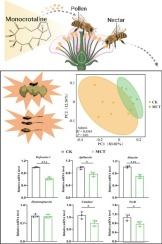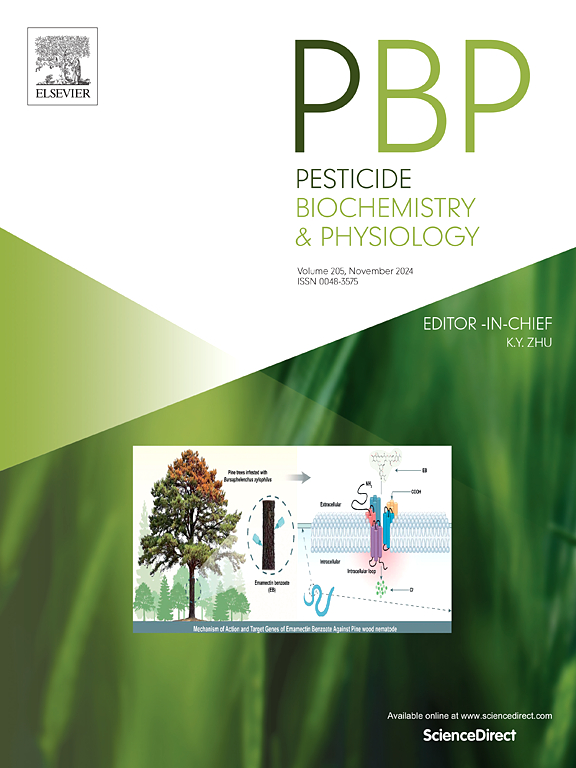一缩胺对蜜蜂脑组织和肠组织的生物损伤
IF 4.2
1区 农林科学
Q2 BIOCHEMISTRY & MOLECULAR BIOLOGY
引用次数: 0
摘要
单克隆碱(MCT)是植物中的一种有毒生物碱,对陆地生态系统中的动物构成威胁。然而,人们对其对授粉昆虫的潜在影响知之甚少。在这里,我们报告了 MCT 对觅食蜜蜂(Apis mellifera)大脑和肠道的影响。接触 MCT 会导致蜜蜂头部重量减轻和腹部肿胀。此外,暴露于 MCT 会导致大脑形态损伤,表现为抗氧化能力下降和细胞凋亡增加,同时肠道组织损伤也伴随着抗氧化能力和细胞凋亡的增加。此外,MCT 改变了蜜蜂核心肠道微生物群落结构,增加了中肠抗菌肽基因的表达。这些研究结果表明,暴露于 MCT 会激活蜜蜂肠道的免疫反应,而大脑则不会表现出免疫反应,反而会出现氧化应激。这项研究为今后探索 MCT 与其他昆虫之间相互作用的研究提供了资源,有助于加深我们对 MCT 在生态系统中的潜在影响的理解。本文章由计算机程序翻译,如有差异,请以英文原文为准。

Biological damage of monocrotaline on the brain and intestinal tissues of Apis mellifera
Monocrotaline (MCT) is a toxic alkaloid present in plants, posing a threat to animals in terrestrial ecosystems. However, little is known about its potential impacts on pollinating insects. Here, we report the effects of of MCT on the brains and intestines of foraging honeybees (Apis mellifera). MCT exposure resulted in a reduction in head weight and swelling of the abdomen in honeybees. Additionally, MCT exposure caused morphological damage to the brain, characterized by decreased antioxidant capacity and increased apoptosis, along with intestinal tissue damage that was accompanied by increased antioxidant capacity and apoptosis. Moreover, MCT altered the core gut microbial community structure in honeybees and increased the expression of antimicrobial peptide (AMP) genes in the midgut. These findings indicate that exposure to MCT activates the immune response in the honeybee gut, while the brain does not exhibit an immune response but instead experiences oxidative stress. This study provides a resource for future research exploring interactions between MCT and other insects, and can help deepen our understanding of MCT's potential impacts in ecosystems.
求助全文
通过发布文献求助,成功后即可免费获取论文全文。
去求助
来源期刊
CiteScore
7.00
自引率
8.50%
发文量
238
审稿时长
4.2 months
期刊介绍:
Pesticide Biochemistry and Physiology publishes original scientific articles pertaining to the mode of action of plant protection agents such as insecticides, fungicides, herbicides, and similar compounds, including nonlethal pest control agents, biosynthesis of pheromones, hormones, and plant resistance agents. Manuscripts may include a biochemical, physiological, or molecular study for an understanding of comparative toxicology or selective toxicity of both target and nontarget organisms. Particular interest will be given to studies on the molecular biology of pest control, toxicology, and pesticide resistance.
Research Areas Emphasized Include the Biochemistry and Physiology of:
• Comparative toxicity
• Mode of action
• Pathophysiology
• Plant growth regulators
• Resistance
• Other effects of pesticides on both parasites and hosts.

 求助内容:
求助内容: 应助结果提醒方式:
应助结果提醒方式:


